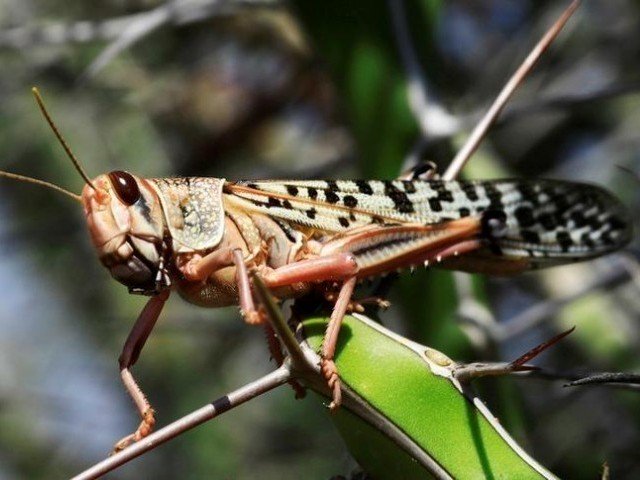Sindh seeks World Bank’s help in fight against locust attacks.
 The Sindh government has approached the World Bank to help eradicate the menace of locust invasions playing havoc with crops in the province.
The Sindh government has approached the World Bank to help eradicate the menace of locust invasions playing havoc with crops in the province.
Chief Minister Murad Ali Shah submitted a request to the World Bank to provide technical as well as financial assistance in fighting ravenous pests that represent a serious threat for food security.
He stated in his plea that the threat to food security because of locus infestation is rising.
Meanwhile, a spokesperson for the National Disaster Management Authority (NDMA) said in a statement 53 districts have been affected by locust invasions, including 28 districts in Balochistan, 11 in Khyber Pakhtunkhwa, 12 in Punjab and two in Sindh.
He said the authority is carrying out a survey and spray in locust-infested areas across the country.
A total of 6,100 hectares of the affected area in Balochistan was sprayed with insecticides over the previous 24 hours, while 2,400 hectares in Punjab, 900 hectares in Khyber Pakhtunkhwa and 272 hectares in Sindh.
KARACHI: The Sindh government has urged the centre to provide six aircraft for aerial spray on an urgent basis to combat a “massive locust attack” as this new attack is feared to be more dangerous compared to the previous ones and may lead to “famine” and a threat to food security, it emerged on Saturday.
The help of the federal government was sought for a host of reasons such as directions of the prime minister in a previous meeting for better coordination between the centre and provinces in terms of provision of aircraft, and a warning by the UN’s Food and Agriculture Organisation (FAO) that this year’s locust attack in Sindh might be severe and may continue for the next two years.
Informed sources told Dawn that Sindh Chief Minister Murad Ali Shah had written a letter to Prime Minister Imran Khan on May 1, drawing his attention towards a possible locust attack in different districts of the province.
“A massive locust attack is expected in Sindh next month,” the CM stated in the letter.
The CM warns the situation may lead to famine and threaten food security of the entire country
It was pointed out that farmlands in Sindh would once again come under an attack of locust swarms from Iran. The CM apprehended that this new attack could “prove more harmful for the crops in the province as compared to the locust attack of the last year”.
The letter also contained a reported prediction by the FAO that this year’s locust attack in Sindh “will be severe and may continue for another two years”.
“This situation is likely to create a disaster, leading to famine and threat to food security in the entire country,” Shah told the PM.
Owing to the Covid-19 pandemic, economic activities had been affected, hence agriculture was considered to be the main source of revival of the economy, the letter said, adding that the PM had chaired a meeting on March 6 to review the steps taken to combat the locust attack.
It was stated in that meeting that total 168,701 acres of cropped area was affected while 997,260 acres of desert area was also affected by the pest.
On that occasion, the PM had “assured to improve coordination between the federal and provincial authorities and had instructed for provision of aircraft and pesticide for aerial spray in the affected areas”.
The CM’s letter also pointed out that Schedule-II of Rule 3(3) of the Rules of Business, 1973 (as amended) under functions of the National Food Security and Research Division (Plant Protection) gives “mandate to the Federal Plant Protection Department for aerial spray and locust control”.
Thus, the CM urged the prime minister to issue necessary instructions to quarters concerned for making “immediate arrangements for six aircraft for aerial spray, ULV sprayers, pesticides including ULV, lambda cyhalothrin, emulsified concentrate (EC) in sufficient quantity; besides the deployment of necessary field teams”.
“This would help combat the situation at this level so that further spread of locust in cropping area is avoided,” reads the CM’s letter.

0 Comments